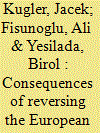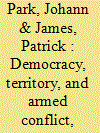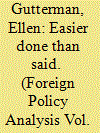|
|
|
Sort Order |
|
|
|
Items / Page
|
|
|
|
|
|
|
| Srl | Item |
| 1 |
ID:
137819


|
|
|
|
|
| Summary/Abstract |
Today, financial crisis once again threatens the unity among member states and future of the European Union. The magnitude of the problem is so grave that observers and analysts have concluded a big decision must be made regarding fiscal union (thus political union) to save EMU. “Is this really the end of the road for Eurozone?” Using Power Transition theory, our analysis shows that trust and relative political capabilities are essential to build a stable Union. While it is clear that the center of global politics is shifting away from Europe and the United States to the Asian giants—the transition from West to East can be effectively planned so that the future units are satisfied with each other rather than distrustful, dissatisfied, and contentious. The slowdown of integration is not simply a regional problem with serious consequences for the economic stability of Europe. Far more importantly, our analysis suggests that the process of integration that has reduced tensions within a region previously characterized by major wars may be declining and that this in and of itself could reset the stage not only for regional confrontations but increase the likelihood that global wars may once more be considered as means to solve disputes. The European Union cannot afford to move from the cooperative contest to a confrontational one where solutions are arrived at by force rather than reason. Therefore, the challenge for European leaders is to resolve the current crisis in the EMU and build upon it a reinvigorated union that once more provides a path for complete regional integration.
|
|
|
|
|
|
|
|
|
|
|
|
|
|
|
|
| 2 |
ID:
137821


|
|
|
|
|
| Summary/Abstract |
Democracy and territory are two of the most important factors that affect conflict and war. Yet no research design looks directly at a possible interaction between these two variables to influence occurrence of armed conflict. This study seeks to answer the following question: “How do two democracies behave when a contentious issue such as territory arises as the source of conflict between them?” Results based on Militarized Interstate Dispute data from 1920 to 1996 produce the conclusion that the pacifying effect of democracy stands up for both territorial dyads and non-territorial ones in spite of the imperatives toward militarization created by territorial conflict. However, territory of high salience still appears to increase the likelihood of armed conflict between two democracies.
|
|
|
|
|
|
|
|
|
|
|
|
|
|
|
|
| 3 |
ID:
137822


|
|
|
|
|
| Summary/Abstract |
The US Foreign Corrupt Practices Act of 1977 (FCPA) is having an unprecedented moment. In 2010, corporations paid $1.8 billion in FCPA fines, penalties, and disgorgements—the most ever recorded in this controversial Act's history and half of all criminal-division penalties at the Justice Department. While this recent pattern of enforcement is itself interesting, a deeper puzzle lies in the origins and early trajectory of the FCPA. Throughout the late 1970s and most of the 1980s, major US business groups opposed its unilateral ban on transnational bribery and lobbied the government to repeal this costly constraint on American businesses operating overseas. Yet, despite a decade of pressure from otherwise powerful groups, the government failed to respond to business demands amidst strategic trade concerns about the FCPA. Why? The paper applies a Constructivist lens, together with concepts from the theory of legal reasoning, to analyze the early history of the FCPA and explain its continued significance in US foreign economic policy. Anti-corruption norm resonance and the pressure publicly to justify norm-transgressing practices made foreign corrupt practices by American businesses “easier done than said.”
|
|
|
|
|
|
|
|
|
|
|
|
|
|
|
|
| 4 |
ID:
137817


|
|
|
|
|
| Summary/Abstract |
What accounts for the variation in the influence of scientists in the policy-making process? Why is it that scientists sometimes appear to exercise significant autonomy in shaping policy agendas, while at other times very little? Scientists are most influential, this paper contends, when they can leverage their recognized expertise by strategically co-opting institutionalized channels of advice. This is most likely to occur in issue areas of high complexity and ambiguity when key policy makers are dependent upon scientists for their counsel. Policy entrepreneurs within competing scientific communities, prevented from accessing key decision makers, wait until windows of opportunity open to undermine the credibility of the incumbent experts, gain access to political leaders, and refocus the policy agenda. This theory is developed and tested through a case-study analysis of the nuclear test-ban debate during the Eisenhower administration from 1954 to 1958. The findings of this paper underscore the need to treat foreign policy decision making as a series of strategic interactions between multiple actors with a broader capacity to influence the policy-making process than traditionally conceived. By doing so, scholars can better understand variations in government decision making across time and issue area, providing important insights into the role of experts in a wide range of public policy domains.
|
|
|
|
|
|
|
|
|
|
|
|
|
|
|
|
| 5 |
ID:
137818


|
|
|
|
|
| Summary/Abstract |
This paper extends systematic analyses of maritime piracy by verifying the robustness of empirical results and examining the forecasting ability of empirical models. Recent research by Ward, Greenhill and Bakke (2010) finds that statistically significant relationships frequently offer poor guidance when it comes to anticipating the inception of civil war. We assess the predictive ability of purported causal factors of piracy using evaluative statistical tools such as receiver-operating characteristic plots, out-of-sample predictions, and outlier analysis. Statistical results for in-sample and out-of-sample tests show that while factors such as military capacity, population size, coastline length, and trade volumes are statistically related to piracy, state fragility has by far the strongest predictive effect despite only being moderately statistically significant in the models. Outlier analysis demonstrates that while several countries experience higher numbers of piracy incidents than predicted, empirical models are generally robust to the presence of outliers. For policymakers, the findings suggest that counter-piracy efforts focused on capacity-building measures have the greatest potential for reducing the piracy threat.
|
|
|
|
|
|
|
|
|
|
|
|
|
|
|
|
| 6 |
ID:
137820


|
|
|
|
|
| Summary/Abstract |
Event data is the preferred method of characterizing directed-dyadic behavior through time and is a very versatile approach able to handle both state and nonstate actors. By scaling and aggregating values on a conflict and cooperation continuum, event data can provide a net measure of conflict between two parties for a set time interval. The CAMEO coding scheme was created to address structural flaws in the WEIS coding scheme and to handle better the post-Cold War environment. However, no systematic study has been completed for assigning fixed-weight conflict–cooperation scale values to the newer coding scheme, leaving an ad hoc transliteration of Goldstein scale values for WEIS as the best option. This paper reports the results of a psycho-physical magnitude scaling survey of 158 students from two universities where the students scaled CAMEO categories for conflict and cooperation. In addition to providing empirically based scale values for CAMEO, the paper also tests whether or not conflict and cooperation exist on a single continuum and whether or not a gender difference exists in perceptions of conflict and cooperation.
|
|
|
|
|
|
|
|
|
|
|
|
|
|
|
|
|
|
|
|
|